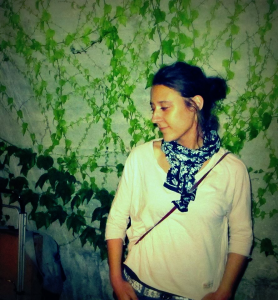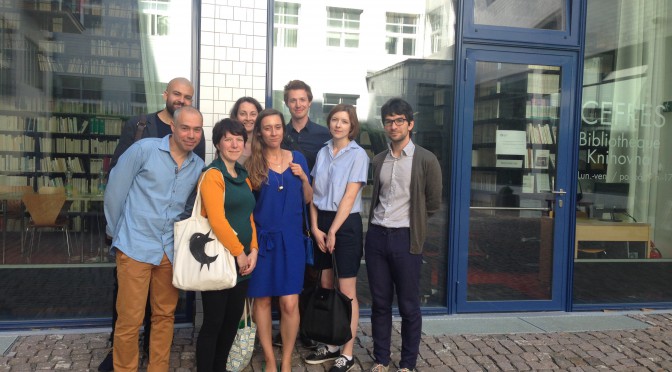Imaginations of Bodily “Otherness” and Prague’s Freak Show Culture 1860-1939
Research Area 2: Norms & Transgressions
Contact: filip.herza@cefres.cz
 My dissertation project traces the history of freak show culture in the 19th- and 20th-century Prague and the Czech lands from the perspective of disability theory. By studying popular exhibitions of “freaks” and other living “curiosities”, I try to explore reproduction of the 19th– and 20th-century disability discourse, including concepts and images of disability and related forms of socially produced “otherness”, namely class, gender and racial difference. I am particularly interested in the significance of the embodied “Other” in fashioning social norms and imaginary social bodies of the time, namely the collective body of nation. Four case studies from Prague’s freak show stages, ranging from 1860s through 1920s, demonstrate the significance of “abnormal” bodies for the imagined Czech national society. The project thus ventures into a disabled history of Czech nationalism, offering a new perspective on nation building and its interconnectedness with biopolitical reasoning, from the late 19th century up until the interwar period.
My dissertation project traces the history of freak show culture in the 19th- and 20th-century Prague and the Czech lands from the perspective of disability theory. By studying popular exhibitions of “freaks” and other living “curiosities”, I try to explore reproduction of the 19th– and 20th-century disability discourse, including concepts and images of disability and related forms of socially produced “otherness”, namely class, gender and racial difference. I am particularly interested in the significance of the embodied “Other” in fashioning social norms and imaginary social bodies of the time, namely the collective body of nation. Four case studies from Prague’s freak show stages, ranging from 1860s through 1920s, demonstrate the significance of “abnormal” bodies for the imagined Czech national society. The project thus ventures into a disabled history of Czech nationalism, offering a new perspective on nation building and its interconnectedness with biopolitical reasoning, from the late 19th century up until the interwar period.
Beside representations of disability in popular entertainment culture, Filip works on the history of science, expert cultures and social movements (such as social hygiene and eugenics) in the 19th and the 20th century, mainly from the perspective of gender, disability and postcolonial theory.
His latest research concerns disability, hygiene and health related politics in the colonial setting of interwar Czechoslovakia, particularly the activities of Czech scientists in Slovakia and Subcarpathian Ruthenia.
CV
Education
Filip holds a Mgr. in cultural and social anthropology from the Faculty of humanities, Charles university Prague (2012), where he also pursue his PhD, under the supervision of PhDr. Lucie Storchová, Ph.D.
Academic jobs and fellowships
From 2017, Filip works as a researcher at the department of gender studies and from 2018 as an assistant professor at the department of anthropology, Faculty of humanities, Charles University Prague. In the years 2014-2016, Filip received fellowships from the University of Vienna, Central European University Budapest and Collegium Carolinum in Munich.
Research projects
2017-2019 Joint grant project GAČR (Czech Grant Agency) and DFG (Deutsche Forschungsgemeinschaft): (Post)Socialist Modernity and social and cultural politics of disability and disablement
2017-2018 Participation on an international project called Staged Otherness: Human Oddities in Central and Eastern Europe 1850-1939 (Polska Akademia Nauk)
Selected Publications
Herza, Filip. (forthcoming). “Faces of Masculinity: Shaving Practices And The Popular Exhibitions Of “Hairy Wonders” In Early 20th Century Prague”. In Beauty And The Norm: Debating Standardization In Bodily Appearance. Palgrave Macmillan.
Herza, Filip. 2016. “Anthropologists and Their Monsters: Ethnicity, Body and Ab/normality In Early Czech Anthropology”. East Central Europe 43 (1-2). Leiden: Brill: 64-98.
Herza, Filip. 2016. “Black Don Juan and The Ashanti From Asch: Representations Of “Africans” In Prague And Vienna, 1892–1899”. In Visualising The Orient: Central Europe And The Near East In The 19Th And 20Th Centuries, Adéla Jůnová Macková, Lucie Storchová, and Libor Jůn, 95-106. Prague: Academy of Performing Arts in Prague (AMU), Film and TV School of Academy of Performing Arts in Prague (FAMU).
Herza, Filip. 2012. “Tiny Artists From The Big World: The Rhetoric Of Representing Extraordinary Bodies During The Singer Midgets’ 1928 Tour In Prague”. In Exploring The Cultural History Of Continental European Freak Shows And ‘Enfreakment’, 193-210. Newcastle upon Tyne: Cambridge Scholars Publishing.

















